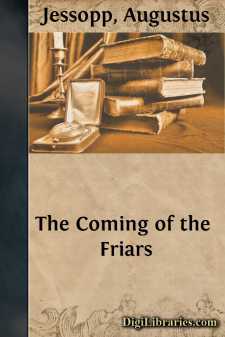Categories
- Antiques & Collectibles 13
- Architecture 36
- Art 48
- Bibles 22
- Biography & Autobiography 813
- Body, Mind & Spirit 142
- Business & Economics 28
- Children's Books 17
- Children's Fiction 14
- Computers 4
- Cooking 94
- Crafts & Hobbies 4
- Drama 346
- Education 46
- Family & Relationships 57
- Fiction 11829
- Games 19
- Gardening 17
- Health & Fitness 34
- History 1377
- House & Home 1
- Humor 147
- Juvenile Fiction 1873
- Juvenile Nonfiction 202
- Language Arts & Disciplines 88
- Law 16
- Literary Collections 686
- Literary Criticism 179
- Mathematics 13
- Medical 41
- Music 40
- Nature 179
- Non-Classifiable 1768
- Performing Arts 7
- Periodicals 1453
- Philosophy 64
- Photography 2
- Poetry 896
- Political Science 203
- Psychology 42
- Reference 154
- Religion 513
- Science 126
- Self-Help 84
- Social Science 81
- Sports & Recreation 34
- Study Aids 3
- Technology & Engineering 59
- Transportation 23
- Travel 463
- True Crime 29
The Coming of the Friars
by: Augustus Jessopp
Description:
Excerpt
THE COMING OF THE FRIARS.
Sweet St. Francis of Assisi, would that he were here again!—Lord
Tennyson.
When King Richard of England, whom men call the Lion-hearted, was wasting his time at Messina, after his boisterous fashion, in the winter of 1190, he heard of the fame of Abbot Joachim, and sent for that renowned personage, that he might hear from his own lips the words of prophecy and their interpretation.
Around the personality of Joachim there has gathered no small amount of mythus. He was, it appears, the inventor of that mystical method of Hermeneutics which has in our time received the name of "the year-day theory," and which, though now abandoned for the most part by sane men, has still some devout and superstitious advocates in the school of Dr. Cumming and kindred visionaries.
Abbot Joachim proclaimed that a stupendous catastrophe was at hand. Opening the Book of the Revelation of St. John he read, pondered, and interpreted. A divine illumination opened out to him the dark things that were written in the sacred pages. The unenlightened could make nothing of "a time, times, and half a time" [Footnote: Dan. xii. 7.] ; to them the terrors of the 1,260 days [Footnote: Rev. xi .3.] were an insoluble enigma long since given up as hopeless, whose answer would come only at the Day of Judgment. Abbot Joachim declared that the key to the mystery had been to him revealed. What could "a time, times, and half a time" mean, but three years and a half? What could a year mean in the divine economy but the lunar year of 360 days? for was not the moon the symbol of the Church of God? What were those 1,260 days but the sum of the days of three years and a half? Moreover, as it had been with the prophet Ezekiel, to whom it was said, "I have appointed thee a day for a year," so it must needs be with other seers who saw the visions of God. To them the "day" was not as our brief prosaic day—to them too had been "appointed a day for a year." The "time, times, and half a time" were the 1,260 days, and these were 1,260 years, and the stupendous catastrophe, the battle of Armageddon, the reign of Antichrist, the new heavens and the new earth, the slaughter and the resurrection of the two heavenly witnesses, were at hand. Eleven hundred and ninety years had passed away of those 1,260. "Hear, O heavens, and give ear, O earth," said Joachim; "Antichrist is already born, yea born in the city of Rome!"
Though King Richard, in the strange interview of which contemporary historians have left us a curious narrative, exhibited much more of the spirit of the scoffer than of the convert, and evidently had no faith in Abbott Joachim's theories and his mission, it was otherwise with the world at large. At the close of the twelfth century a very general belief, the result of a true instinct, pervaded all classes that European society was passing through a tremendous crisis, that the dawn of a new era, or, as they phrased it, "the end of all things" was at hand.
The Abbot Joachim was only the spokesman of his age who was lucky enough to get a hearing....


